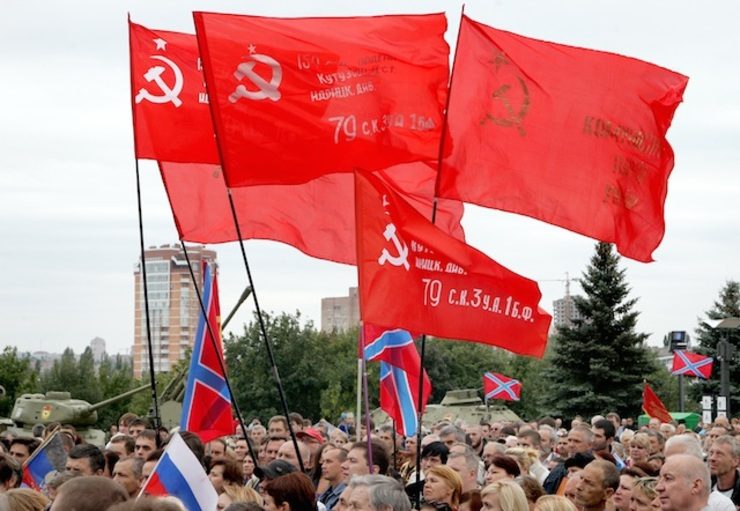SUMMARY
This is AI generated summarization, which may have errors. For context, always refer to the full article.

KIEV, Ukraine (2ND UPDATE) – Ukraine was set Tuesday, September 16, to ratify a landmark EU pact at the heart of the country’s deadliest crisis as the government pushed its plans for limited self-rule in the pro-Russian east.
But renewed clashes that killed 4 civilians Monday heaped further pressure on a fragile truce in the bloody 5-month war and raised new questions about whether President Petro Poroshenko will succeed in keeping his splintered country together.
Lawmakers in the Ukrainian and European parliaments are set to sign the 1,200-page political and economic association agreement during a live video hookup that begins at 1000 GMT (6:00 pm, Manila time).
But the historic occasion has been muted by the two sides’ decision to bow to Russian pressure and delay until 2016 applying the free trade rules that pulled Ukraine out of a rival union being built by the Kremlin.
The rejection of the same EU deal by Kremlin-backed president Viktor Yanukovych in November triggered the bloody chain of events that led to his February ouster and Russia’s subsequent seizure of Ukraine’s Crimea peninsula.
The defiant decision by Kiev’s new pro-Western leaders to still strike the agreement saw Moscow cut off its neighbour’s supply of Russian gas and allegedly orchestrate a separatist revolt that has now claimed more than 2,700 lives.
Russia’s denials of involvement have not spared it from waves of punishing Western sanctions that have left President Vladimir Putin more isolated and acting less predictably than at any stage of his dominant 15-year reign.
But a European-mediated truce Kiev and Moscow clinched on September 5 has offered the first significant glimmer of hope that the crisis may at last be abating and allowing East-West tensions to mend.
Three years of self-rule
Insurgency leaders and officials in Kiev have traded blame daily for who was responsible for repeatedly breaking the ceasefire.
Reporters and European monitors on the ground are also rarely able to tell where the sporadic shelling and gunfire originates.
Local authorities said three civilians were killed in separate shelling incidents in Donetsk and another in the neighboring village of Makiivka – bringing the total number to 10 in two days.
An unconfirmed number of Ukrainian soldiers were also killed Monday in a new rebel advance toward the long-shuttered Donetsk airport that had been one of the war’s main flashpoints since Poroshenko’s election at the end of May.
Despite the violence, Poroshenko on Tuesday submitted to parliament a peace package that offers three years of limited self-rule to parts of the rebel-held territory.
It also crucially guarantees the right for Russian to be spoken in all state institutions – a particularly sensitive issue in the war zone.
The Ukrainian leader argued Monday that his plan offers Kiev the best way out of crisis because it guarantees “the sovereignty, territorial integrity and independence of our state.”
Parliament is now dominated by government supporters and the measures are likely to pass.
But some political leaders and especially members of right wing groups that played a small but instrumental role in protests that forced out the old regime have questioned whether Poroshenko was ceding too much to Moscow.
Deputy Foreign Minister Danylo Lubkivsky cautioned after submitting his resignation that the delay of the free trade deal with the EU sent “the wrong signal to everyone: the aggressor (Russia), our allies and, most importantly, the citizens of Ukraine.”
December 7 eastern elections
The broad-ranging political proposals allow local legislatures in rebel-held regions to set up their own police forces and name judges and prosectors.
Snap local polls on December 7 will establish new councils in the areas in Ukraine’s vital coal and steel belt that will seemingly not be accountable to Kiev in any way.
A separate draft law protects from criminal prosecution “participants of events in the Donetsk and Lugansk regions” – a measure that appears to apply to both the insurgents and Ukrainian government troops.
Amnesty International has accused fighters on both sides of abuses that might be classified as war crimes.
Yet the broader autonomy offer appears to have done little to sate insurgency leaders who want membership in Novorossiya – a charged term Putin uses to describe a tsarist Russia that incorporated parts of Ukraine.
“The government in Kiev is only using the ceasefire to regroup its forces and attack us again,” the self-declared Donetsk People’s Republic leader Alexander Zakharchenko said.
Western allies kept up the pressure by launching more than a week of US-led NATO war games in western Ukraine on Monday that are meant to send a blunt message to Russia about having any thoughts of pushing its troops deeper into the former Soviet state.
Russia has tens of thousands of soldiers in Crimea but denies NATO charges it sent more than 1,000 elite forces to help the militias launch a surprise counter-offensive at the end of last month. – Rappler.com
Add a comment
How does this make you feel?
There are no comments yet. Add your comment to start the conversation.